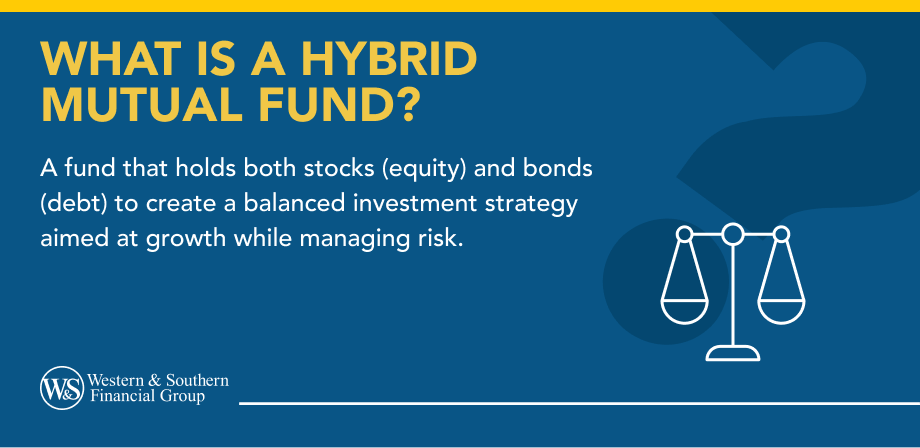

Table of Contents
Key Takeaways
- Hybrid mutual funds combine stocks and bonds in one portfolio, offering investors a diversified investment option.
- Hybrid funds simplify investment research and purchasing by reducing the need for multiple funds, potentially lowering costs.
- Hybrid funds may reduce volatility compared to funds that invest solely in stocks due to diverse investment securities with varied risk attributes.
- Hybrid funds may be tax-inefficient, generating more taxes than other types of funds and may not always compliment other investments.
- Since diversification doesn’t guarantee growth or protection from loss, it’s essential to research and compare hybrid funds.
There are many types of mutual funds with various benefits. A hybrid mutual fund (also known as a blend fund) is unique because it can hold multiple security types in one portfolio and invests in a combination of stocks and bonds, or it may invest in other mutual funds.
Here's some more information to help you decide whether these investment vehicles could be suited to your financial goals.
What Is a Hybrid Mutual Fund?
Hybrid mutual funds are mutual funds that hold multiple security types, such as stocks and bonds, in one fund portfolio. The asset allocation or investment mix of a hybrid mutual fund can remain fixed, or change over time. Hybrid funds that feature equity (e.g., stocks) and debt (e.g., bonds) in roughly equal measure are commonly referred to as balanced funds.
Types of Hybrid Funds
Balanced Funds
Balanced funds, like all mutual funds, are often categorized by their objective, and their asset allocation will reflect this objective. These allocations are often fixed, but not necessarily. No investment type or mix can guarantee growth, however, and may instead lose value over time.
Target Date Funds
Target date funds are a type of hybrid mutual fund where the objective is defined by a target year or date. One common feature of target date funds is that their allocation could gradually shift more conservative, to a higher bond allocation than stocks, as the target year or date approaches. This is not built into every target date fund, and could also be a feature of other kinds of mutual funds. This is just one possible approach to investing toward a target date or other objective. The principal value of the Retirement Funds and Target Funds (collectively, the “target date funds”) is not guaranteed at any time, including at or after the target date.
For example, a target retirement 2050 fund could have a higher stock allocation and lower bond allocation now. But by the year 2050, the bond allocation could be much higher than the stock allocation.
Advantages of Hybrid Mutual Funds
Hybrid mutual funds offer numerous advantages to investors, making them an appealing option for many. Here are some advantages:
- Diversification: Since hybrid funds can invest in multiple security types or a combination of other mutual funds, an investor may be able to get a broadly diversified portfolio within just one fund. Diversification does not guarantee growth or protection from loss.
- Reduced Volatility: Since hybrid funds may combine diverse investment securities with different risk attributes, they may reduce volatility (large value fluctuations) compared to stocks or mutual funds that invest in only stocks. Bonds and mutual funds composed only of bonds could be even less volatile.
- Simplicity: Hybrid funds can simplify the process of researching, analyzing and buying investments by reducing the number of funds needed to build a diversified portfolio.
- Cost Savings: Although some hybrid funds can have above-average expenses compared to funds in other categories, investing in just one hybrid fund may help reduce total investment costs compared to investing in multiple funds to achieve the same objective.
- Professional Management: Rather than managing your own investments, a mutual fund is professionally managed, whether hybrid or not. This may help save you time or money.
Disadvantages of Hybrid Mutual Funds
Here are disadvantages of hybrid funds:
- Taxation: Hybrid funds are generally not tax efficient, which means they may produce more taxes than some other types of funds. This is because a typical hybrid fund may invest in large-cap, dividend-producing stocks and taxable bonds. If purchased in a taxable account, the investor may owe more taxes on a hybrid fund than on other mutual funds.
- Lack of Customization: Although hybrid funds are professionally managed, the manager does not allocate the assets and investment types with any specific individual in mind. Therefore, the fund's allocation may not be appropriate for some investors, or it may not complement other investments that the investor may hold in addition to the hybrid fund.
- Lower Returns: Hybrid funds typically invest in a combination of stocks and bonds. Although this diverse mix can reduce volatility, the bond exposure may reduce long-term returns, compared to mutual funds that invest in stocks alone.
Invest in Learning
With a hybrid mutual fund, an investor can get exposure to multiple security types in one fund. For example, a hybrid fund investing in a balance of stocks and bonds is like getting two different types of mutual funds in one. This may benefit an investor by offering a diversified investment in just one fund, although, diversification cannot guarantee a profit or prevent against loss. However, before purchasing shares of hybrid funds, consider learning how they work and compare with other investment types, or speak to a financial professional.















